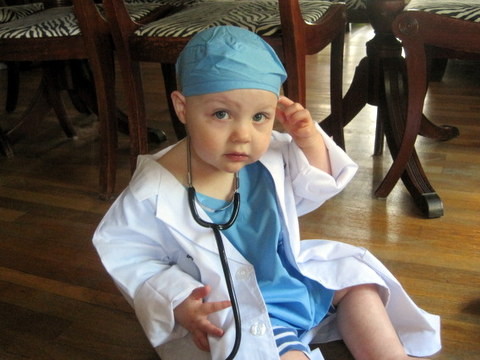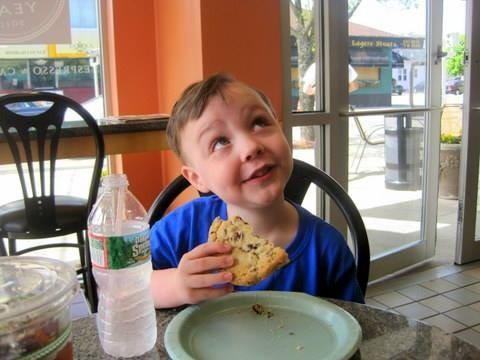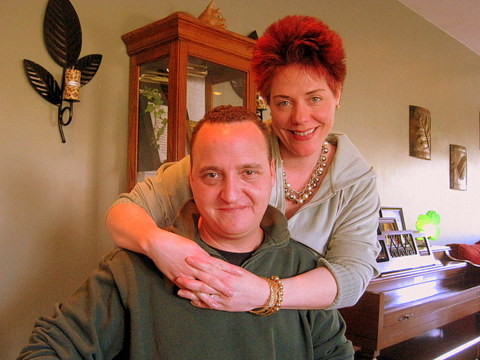A hopeful treatment to a parent's worst nightmare
Finding answers to a child's plunge into darkness
PROVIDENCE -- It was a parent’s worst nightmare. Daniel Corrigan and Jennifer Toone Corrigan’s four-year-old son, Edward, a happy, outgoing child, began to change from his normal ebullient self. In July, things went from bad to worse: Edward suddenly stopped eating food; he soon stopped drinking water.
Despite medical intervention – including three days of emergency care at Hasbro’s Children’s Hospital and a battery of tests – none of the doctors could determine what was wrong.
“They gave him an MRI, an ultrasound, to make sure that his stomach organs were working properly. His metabolism and his endocrinology checked out fine, ” Jennifer said, sitting in the breakfast nook in her Providence home, while her husband sat with Edward. On the blackboard behind her was the message, written in chalk, “Edward is our world!”
Edward was then referred to Bradley Hospital, where he spent three weeks in intensive therapy sessions to address what appeared to clinicians to be a psychological issue – depression or anger management issues, perhaps a result of an unknown trauma.
Through Bradley’s Pediatric Partial Hospital Program, Edward participated in a family-based day treatment program for children through age six who have “serious emotional, behavioral, feeding, sleeping or relationship problems.”
But, at the end of three weeks, Edward’s condition had gotten worse. He was no longer walking or talking. He was being fed through a nasogastric, or NG feeding tube that carried food and medicine to the stomach through his nose, and prone to tantrums and fits that would last for 10 hours at a time.
“Edward went from being ebullient to being inconsolable,” Jennifer said, her voice staining as she relived the stressful tale. “We were at a loss of what to do.”
A friend of a friend, someone who was a doctor, asked in they had looked into PANS -- Pediatric Acute-onset Neuropsychiatric Syndrome. “It was an ‘Oh My God’ moment. The switch went on. One minute you’ve got this great happy wonderful child, and the next minute,” she said, and stopped, her voice falling off into silence.
The National Institute for Mental Health’s Pediatric Developmental Neuroscience Branch describes the diagnostic criteria for PANS as:
• The abrupt, dramatic onset of obsessive-compulsive disorder (including severely restricted food intake)
• The concurrent presence of additional neuropsychiatric symptoms, with similarly severe and acute onset, from at least two of the following seven categories: anxiety (particularly, separation anxiety); extreme mood swings and/or depression; irritability, aggression and/or severely oppositional behaviors; behavioral regression, such as throwing temper tantrums; deterioration in school performance; sensory or motor abnormalities; and somatic signs and symptoms, including sleep disturbances.
The diagnosis fit Edward’s insidious personality devolvement. And so Jennifer and her husband began to pursue getting treatment for PANS. At first, her pediatrician was dubious, Jennifer continued because it was considered a controversial diagnosis. The recommended course of treatment is heavy doses of antibiotics.
PANS conference in Providence
On Saturday and Sunday, Nov. 9 and 10, the Northeast PANS/PANDAS Parent Association, with support from the PANDAS Network.org, is hosting a sold-out conference at the Marriott Providence Downtown Hotel.
It is a first-of-its-kind event, drawing medical and scientific experts and parents together to support the medical community in its mission to help children suffering from PANS and PANDAS (considered a version of PANS caused by strep infection) and create opportunities to help families looking for solutions.
One of the featured speakers will be Dr. Rosario Trifiletti, who will be discussing the neurological basis and the scientific and clinical perspectives of the affliction.
Trifiletti is now treating Edward, having determined that his infection that probably caused the onset of PANS is from mycoplasma, not from strep, and he has prescribed the antibiotic Biaxin.
Edward has been taking Biaxin for about a week, and according to Jennifer, there are promising signs in her child’s behavior. He is beginning to sleep through the night, he allows her to read to him, his fits, which once could last hours, are now of shorter duration, five or 10 minutes.
Trifilletti plans to visit the Corrigan family at their home when he is in Rhode Island at the conference, and he has become a member of the invitation-only Facebook page that Jennifer has set up.
The onset of PANDAS, Trifiletti told ConvergenceRI, was first described in the mid-1990s, related to what was seen as a complication from strep infections, which resulted in an immune system response with the infection attacking the brain.
Further research, he continued, found that strep was only one of a number of triggers, such as mycoplasmic pneumonia, which he has pinpointed as the probable cause of Edward’s PANS.
“There appears to be a genetic disposition,” Trafiletti said, related to a “quirky” reaction to an immune disorder. The symptoms, he continued, “look similar to autism.”
More than a file on a desk
Jennifer has nothing but praise for Trifiletti, calling him “the most receptive, most caring advocate.” By comparison, she said she had not heard from her pediatrician in four weeks.
The lesson she has learned from her experience with the health care delivery system is that the system doesn’t work very well. “I have to remember at all times that I am simply a file on someone’s desk,” she said, with anger. “Edward Corrigan is a file on someone’s desk at each of these practitioners. Until I make us become a reality to them, we remain a file. It requires constant advocacy.”
Jennifer admitted that the whole experience has been “really stressful” for herself and her husband. Luckily, she works from home, running a small communications firm. “I have had to pare down my client list, quite honestly. But everyone has been wonderful and understanding.
At first, she found it difficult to share what was happening, but now Jennifer has developed a very large support network, with 350 friends through a Facebook community.
“I used to say that Facebook was the devil’s playground, but now it’s my support group,” she said. There is a Rhode Island PANs parent support group, but Jennifer said that she hasn’t yet been able to attend.
“With Edward, it’s been all encompassing, 24/7. I went to get my hair cut the other day and I was so filled with angst, trying to get back home,” she said.
A recent post on her Facebook page shared her hopefulness: “Edward seems much better today so far, knock on wood. Thank you for the continued prayers and positive energy. It's all helping us -- for certain.”








